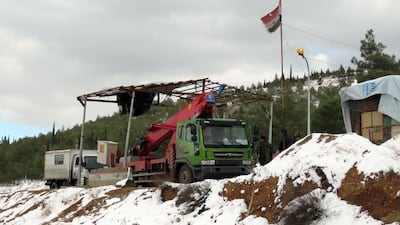DAMASCUS // Syrian government troops gained control of the village that houses the main water source for Damascus on Saturday, as rebel fighters began to evacuate.
In a major development, rebels agreed to leave the Barada Valley, potentially ending a month-long stand-off that deprived nearly five million people of water and trapped tens of thousands of civilians in the area which the rebels first seized in 2012.
Syrian state TV showed buses lined up to transport rebel fighters out of Ain Al Fijeh, the village housing the water plant with the same name, which supplied most of the water for the capital.
“The Syrian army hoisted the Syrian flag above the installation,” declared the accompanying commentary, signifying a deal was in place.
Earlier this month, rebels struck a truce with Syrian authorities to allow the water pipes to be repaired, but the deal was called off after a mediator was killed.
The monitoring group, the Syrian Observatory for Human Rights said government forces entered Ain Al Fijeh along with ambulances to transport the injured as part of the deal to end the fighting there. But director Rami Abdel Rahman said this was just “a first stage” in implementing the deal towards repairing the station and allowing water to return to millions in the capital.
The regime has accused the rebels of cutting off the mains, while the armed opposition said regime bombardment had destroyed the infrastructure.
The ceasefire, brokered by Russia and Turkey, and in place since December 30 was tested by the fighting in the Barada Valley, which was sparked by the government claiming the rebels had poisoned the water source at Ain Al Fijeh – a claim the rebels denied.
As part of the deal, rebels can choose to stay in the area but hand over their weapons, or leave for the northern province of Idlib, the last major stronghold of the armed opposition. The military media said about 1,200 fighters are expected to surrender their arms.
The issue of the Barada Valley was one of the main focuses of the talks in Astana, Kazakhstan last week between the rebel and Syrian government representatives. The talks were sponsored by Russia and Turkey and supported by Iran, and ended with a call to reinforce the ceasefire and put mechanisms in place to monitor violations.
* Associated Press

